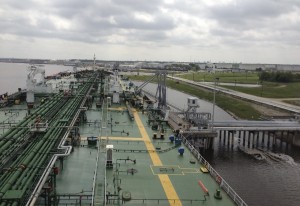More Refining and Bigger Ships Stress Sabine-Neches Waterway

Reuters /STAFF /LANDOV
A tanker makes a call at the Sunoco Logistics terminal on the Sabine-Neches waterway in Nederland, Texas, April 26, 2013.
From Houston Public Media:
The U.S. Chamber of Commerce and the AFL-CIO are calling attention to the country’s aging roads, bridges, and shipping channels. It’s Infrastructure Week, an annual event that looks at how the economy is affected when facilities aren’t properly maintained.
Maintenance is a big issue right now on the Sabine-Neches Waterway. It may not be as well known as the Houston Ship Channel but it handles a lot of business.
Winding along the Texas-Louisiana border, the 63-mile-long waterway serves the ports of Beaumont and Port Arthur. It handles about 100 million tons of cargo a year and it’s a major refining center that’s responsible for about 288,000 jobs in the region.
But port officials are concerned about the future as they prepare to handle bigger ships from a widened Panama Canal.
Clayton Henderson is the Assistant Manager of the Sabine- Neches Navigation District. He says they’re already handling some larger vessels.
“As a matter of fact a lot of the ships that show up on our waterway currently, they’re already drafting as deep as they can, to the point where some of them are running two to three feet under-keel clearance.”
The waterway’s main channels are currently about 40 feet deep, and Henderson says that doesn’t leave the bigger ships a lot of room to operate.
“For instance if you are a scuba diver and you were diving on our waterway, if you were crazy enough to do that, you probably couldn’t pass under that ship as it went overhead because it’s having to use so much of our waterway’s depth currently.”
Deepening channels is a big concern for shippers, but the most pressing transportation issue for most Texans is roads.
The American Society of Civil Engineers gave Texas an overall grade of “C” on its most recent infrastructure report card. Texas roads got a grade of “D.”
State Senator Robert Nichols chairs the Senate Transportation Committee. He says he’s concerned about the economic impact of failing infrastructure.
“Well if people can’t get to work, and customers can’t get to businesses to purchase the goods they want, it will definitely impact in a negative fashion.”
TxDOT currently maintains close to 80,000 miles of highways in Texas and officials have pegged the state’s current transportation needs at about $4 billion. Nichols says those roads only last 40 to 50 years before they have to be rebuilt.
“Traditional revenues for transportation which are state and federal fuel taxes, vehicle registration fees, no longer even cover the cost to preserve the system.”
Nichols is backing a proposed constitutional amendment that would divert oil and gas revenue from the state’s rainy day fund, and put it toward transportation.
But he says that alone isn’t enough, and the state needs to find additional sources of transportation funding.
“And we’ve been borrowing about $2 billion a year for the last 10 to 12 years, and we’ve racked up over $20 billion in debt.”
Back at the Sabine-Neches Waterway, their financial picture may be getting a bit brighter. A bill making its way through Congress would provide federal funds for a major dredging project that would deepen channels from 40 to 48 feet.